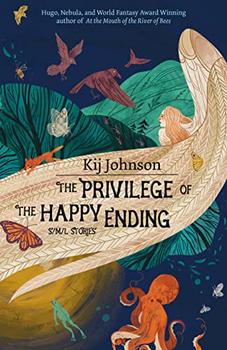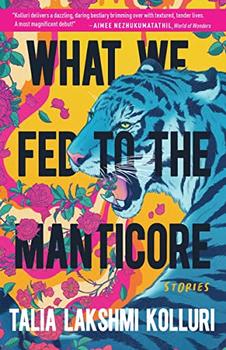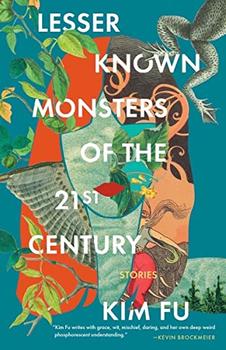Summary | Excerpt | Reviews | Beyond the book | Read-Alikes | Genres & Themes | Author Bio

Small, Medium, and Large Stories
by Kij JohnsonThis collection of speculative stories feels like being in a vivid dream that you don't want to wake
up from. Kij Johnson's imaginative narratives are utterly surreal and somewhat dark, yet laced
with wit. Their language is highly literary, almost poetic, and draws the reader deeper into Johnson's world.
The only novella-length story in the book, "The Dream-Quest of Vellitt Boe," follows one of many full-time inhabitants of the realm of dreams, which people from the waking world visit when they sleep. When a student at the realm's women's college, where the main character teaches, runs away, the main character must journey to our world to retrieve her. This is a classic quest in the vein of The Lord of the Rings, complete with distinct societies of imaginary species. However, something that sets this story apart from similar ones is that the main character is an older woman. It is so refreshing to see a female lead in a fantasy story who is portrayed as neither sex object nor ingenue, but as someone who has gained her wisdom through decades of work and travel.
The book's titular story has dark fairytale vibes. It follows an orphaned girl and her talking chicken as they flee an army of flesh-eating monsters devouring its way through different villages. The plot explores the varied, flawed ways in which people respond to crises, and how easily the hero of one group's story can be seen as the villain of another's. Throughout, the narrator breaks the fourth wall to make wry, almost cynical comments to the reader, like, "Here is where we stop, if you want a happy ending."
Real, imagined and extinct species of animals appear throughout the book. The surreal horror story "The Ghastly Spectre of Toad Hall" features a Wind in the Willows-inspired cast of anthropomorphized creatures who live in homes, wear clothes and exchange Christmas gifts. The core characters of "Coyote Invents the Land of the Dead" are simultaneously women, animals and goddesses. "Noah's Raven" follows the story of Noah's ark from the perspective of a raven on board who takes a rather dim view of the Old Testament prophet.
One standout is "The Apartment Dweller's Bestiary," in which a list of imaginary
apartment-dwelling pests and pets is used as a vehicle for tiny stories set in our contemporary world. The Grey Regia has strong preferences about its owner's partners, while the Hooded Quilliot pines for its former owners. We're told little, sometimes nothing, about what these creatures look like. They're referred to like something we should know about, as if they were as common as cats and dogs.
The story ends, "It occurs to you that in another life, you might very well be the begitte, the lopi, the quilliot," pointing to the capacity of stories centered on animals to pull us into a fresh perspective. How would a raven feel about being trapped on Noah's ark? The reader is drawn into the unfamiliar through these characters, only to be hit with the universality of feelings like grief and loneliness.
Riddles are also a recurring element in this collection. "Five Sphinxes and 56 Answers" blends a feminist recharacterization of the sphinx in the Oedipus myth with a modern woman's fraught relationship with her mother. "Crows Attempt Human Riddles and One Joke" is exactly what it sounds like, a surreal list of riddles crows might make up. In "Tool-Using Mimics," suggestions are made as to the origins of a photograph that appears to show a human girl with tentacles. The reader is encouraged to puzzle out questions themselves, perhaps engaging with the story in a more active way.
This book's settings feel like something out of a Studio Ghibli film (or in the case of the darker stories, a Guillermo del Toro film). It's immersive and supernatural enough to appeal to diehard fantasy fans, but also addresses universal themes like family relationships and loss. The literary prose and character-driven stories (you won't find hard magic systems here) mean it might make a good introduction to the fantasy genre for those who usually read more grounded contemporary works. It's simultaneously creepy and cozy, making it perfect to curl up with on a crisp autumn day.
![]() This review
first ran in the November 1, 2023
issue of BookBrowse Recommends.
This review
first ran in the November 1, 2023
issue of BookBrowse Recommends.

If you liked The Privilege of the Happy Ending, try these:

by Talia Lakshmi Kolluri
Published 2022
In nine stories that span the globe, What We Fed to the Manticore takes readers inside the minds of a full cast of animal narrators to understand the triumphs, heartbreaks, and complexities of the creatures that share our world.

Lesser Known Monsters of the 21st Century
by Kim Fu
Published 2022
A dazzling and daring debut story collection by PEN/Hemingway finalist, Kim Fu.
Your guide toexceptional books
BookBrowse seeks out and recommends the best in contemporary fiction and nonfiction—books that not only engage and entertain but also deepen our understanding of ourselves and the world around us.